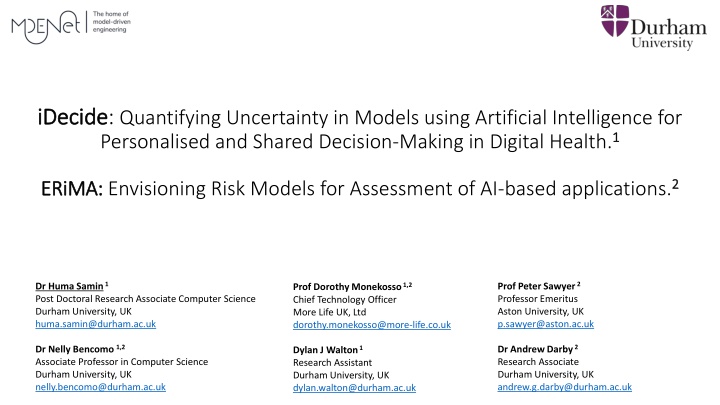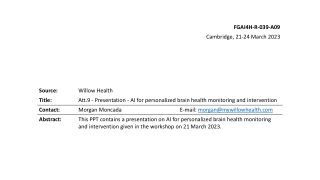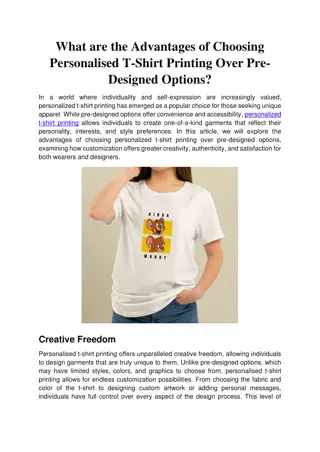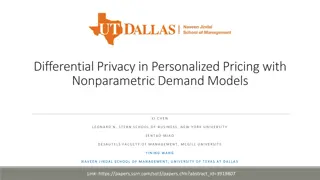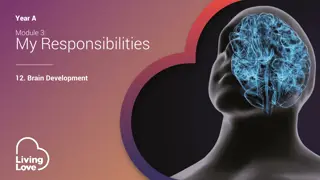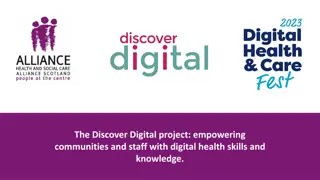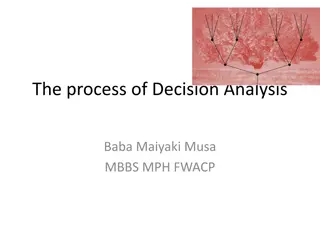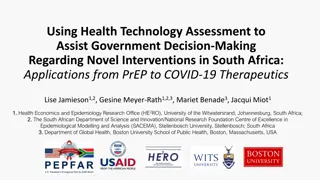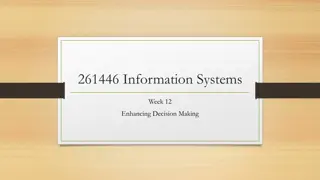Personalized Decision-Making in Digital Health
Utilizing artificial intelligence for personalized and shared decision-making in digital health involves quantifying uncertainty in models to tailor treatments, explore risks, and achieve patient health goals. Researchers aim to map experiences in decision-making under uncertainty from self-adaptive systems to digital health scenarios, such as weight management for conditions like type 2 diabetes and hypertension, to optimize benefits and reduce risks.
Uploaded on Mar 10, 2025 | 2 Views
Download Presentation

Please find below an Image/Link to download the presentation.
The content on the website is provided AS IS for your information and personal use only. It may not be sold, licensed, or shared on other websites without obtaining consent from the author.If you encounter any issues during the download, it is possible that the publisher has removed the file from their server.
You are allowed to download the files provided on this website for personal or commercial use, subject to the condition that they are used lawfully. All files are the property of their respective owners.
The content on the website is provided AS IS for your information and personal use only. It may not be sold, licensed, or shared on other websites without obtaining consent from the author.
E N D
Presentation Transcript
iDecide iDecide: Quantifying Uncertainty in Models using Artificial Intelligence for Personalised and Shared Decision-Making in Digital Health.1 1 ERiMA ERiMA: : Envisioning Risk Models for Assessment of AI-based applications.2 2 Dr Huma Samin1 Post Doctoral Research Associate Computer Science Durham University, UK huma.samin@durham.ac.uk Prof Peter Sawyer 2 Professor Emeritus Aston University, UK p.sawyer@aston.ac.uk Prof Dorothy Monekosso 1,2 Chief Technology Officer More Life UK, Ltd dorothy.monekosso@more-life.co.uk Dr Nelly Bencomo 1,2 Associate Professor in Computer Science Durham University, UK nelly.bencomo@durham.ac.uk Dr Andrew Darby 2 Research Associate Durham University, UK andrew.g.darby@durham.ac.uk Dylan J Walton 1 Research Assistant Durham University, UK dylan.walton@durham.ac.uk
Personalized and Shared Decision-Making To achieve: Patient s Target Health Goals Consultation Preferences Values Beliefs Past Health Records Doctor Shares Information Patient considers Options Together they make Decisions
Research Background Decision-Making under Uncertainty Self-Adaptive Systems Models @Runtime Abstract representations that should be: causally connected to the system being modelled offers reflective capabilities. The system changes The runtime model changes
Research Background Partially Observable Markov Decision Process Model@Runtime for multi-objective decision-making for Self-Adaptation. * Samin, Huma, Nelly Bencomo, and Peter Sawyer. "Decision-making under uncertainty: be aware of your priorities." Software and Systems Modeling (2022): 1-30.
Aims of the Projects Map the experience with decision-making under uncertainty from the domain of Self-adaptive systems to cases of personalized and shared decision-making for digital health. 1 Risk and Value Analysis based on the decisions: To perform exploratory analysis to study the relationship of decisions for the treatments/interventions over time and the goals achieved while identifying risk levels and utility value of the decisions made. 1,2 To design and develop AI Risk Model-driven Analysis Framework.2
Case Study: Weight Management Goal: Maximizing Benefits and Minimizing Risks Type 2 Diabetes, Hypertension, and Sleep Apnea Decisions: Bariatric Surgery or Adjust Diet Plan and Exercise Plan Observations: Symptoms and Past Health Records BMI> 40 BMI between 35 and 40 + Obesity related Conditions: Type 2 Diabetes, High Blood Pressure BMI between 30 and 40 BMI less than 30
POMDPs Time t Time t+n Time t-1 A A A NFR NFR State NFR NFR State NFR NFR State R O R O R O Reward node Observation node Action Node State node
POMDPs Time t Time t+n Time t-1 Treatment Treatment Treatment NFR NFR Benefits/Risks NFR NFR Benefits/Risks NFR NFR Benefits/Risks EU EU EU Symptoms Symptoms Symptoms Reward node Observation node Action node State node
Risk Analysis using Surprise Surprise is a measure of unexpectedness. Different probabilistic measures: Bayesian Surprise Confidence Corrected Surprise Bounding Surprise using Sigmoid Function F(x) = 1 / (1 + e-x)
Case Study Remote Data Mirroring (RDM) Copies of important data are stored at one or more secondary locations Goal: Protect data against loss and unavailability Can be configured (adapted) in terms of two Remote mirroring protocols (Topologies) Adaptation actions/interventions Minimum spanning tree (MST) ++ MC but --MR -- MC but ++MR Redundant topology (RT) Trade-off and Optimization of Quality Properties; aka non-functional requirements (NFR) Minimization of Costs (MC) Maximization of Performance (MP) Maximization of Reliability (MR) under environmental uncertainty of link failures and varying ranges of bandwidth consumption *Samin, Huma, et al. "RDMSim: an exemplar for evaluation and comparison of decision-making techniques for self-adaptation." 2021 International Symposium on Software Engineering for Adaptive and Self-Managing Systems (SEAMS). IEEE, 2021.
Risk Analysis CCS MC Classifications Bayes MC Classifications Low 0.4 Low 0.3 Low- mid 0.7 Low- mid 0.7 Middle 0.2 Middle 0.4 High- mid - High- mid - High 0.5 High 0.5, 0.6 Risk Levels based on Failure Rate
Research Outputs Workshop Paper: Walton, Dylan J., Huma Samin, and Nelly Bencomo. "Modelling Uncertainty for Requirements: The Case of Surprises." 2023 IEEE 31st International Requirements Engineering Conference Workshops (REW). IEEE, 2023. Tutorial: Andrew Darby, Peter Sawyer, Nelly Bencomo. Speculative Design and Requirements Engineering. , IEEE 31st International Requirements Engineering Conference Tutorials, 2023.
Next Steps Explore further the case of PSDM by exploring different patient profile cases in consultation with MoreLife, UK. Applying decision-making offered by POMDPs for PSDM, and evaluate the decision-making offered. Research Funding: In collaboration with NHS: EPSRC IAA : WeDecide: Clinical Tool For Shared Decision-Making For Treatment Of Menopause Symptoms
